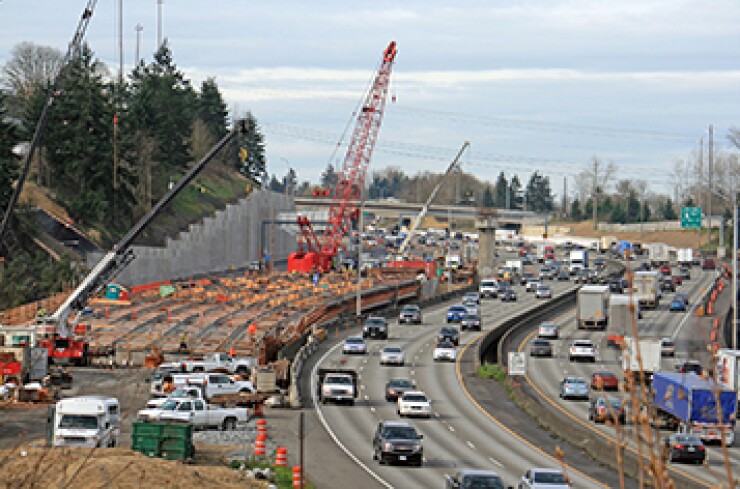
DALLAS – A blue-ribbon panel studying transportation funding in the Seattle area proposed a regional miles-traveled road charge as the best way to resolve a $36 billion gap between the Puget Sound area's infrastructure needs and its expected revenue over the next 25 years.
The mileage fee was the top-rated revenue option in the draft report by the Puget Sound Regional Council's Transportation Futures Task Force. The ranking was based on criteria including stability, predictability, and the ability and flexibility to cope with changing needs and conditions.
"Investments in the transportation system are not keeping up with the need of the growing Puget Sound region and its environment," the report said. "Traditional funding sources are no longer capable of maintaining or improving mobility in this growing region."
The panel's report recommended that local officials pursue funding for a regional pay-per-mile pilot project in coordination with the state.
The 16-member transportation task force spent most of last year examining alternative funding options including the expansion of tolling, a higher gasoline tax, and a new carbon tax. Members include Seattle mayor Ed Murray, Tacoma mayor Marilyn Strickland, and King County executive Dow Constantine.
A regional transportation plan adopted in 2014 identified $173.6 billion of highway and transit infrastructure needs through 2040, and put the revenue gap at $62 billion. A transportation funding package adopted by the state legislature last year reduced the shortfall but did not eliminate it, the panel said.
"Unfortunately, even with these new revenues, the shortfall is still an estimated $36 billion [below what is needed] to pay for planned investments outlined for future decades," the task force said. "This isn't just for expensive new infrastructure, but also for critical maintenance, preservation and operational priorities."
Local jurisdictions face a cost of more than $26 billion to maintain 30,000 lane-miles of road and 800 bridges through 2040 with another $23 billion to expand the road network so it can accommodate expected growth, the panel said. Public transit needs in the area top $19 billion.
"Traditional revenue sources cannot meet this need," the report said.
Washington's gasoline tax generates about $250 million per year, with fiscal 2014 collections just 1% higher than in 2001, the report notes. Over the same period, inflation in construction costs has reduced the fuel tax's purchasing power by 46%.
"Despite raising state gas taxes several times over the last decade or so, structurally those taxes are going to buy less over the long term and we need to replace that," says Ben Bakkenta, a planner with the Puget Sound Regional Council. "A lot of these state gas taxes we have been raising have been pledged to pay off bonds for large state projects, so less is filtering down to the local level."
The Washington Legislature passed a $16.1 billion transportation revenue bill last year that raised the state gasoline tax by 11.9 cents per gallon over two years and authorized $5.3 billion of state general obligation bonds for road projects.
Lawmakers also authorized Central Puget Sound Regional Transit Authority to ask voters in November to approve up to $15 billion of additional revenue over the next 15 years. The transit authority wants to raise its existing 0.9% sales tax by 0.5%, increase a vehicle registration fee, and levy a property tax of up to 25 cents per $1,000 of assessed value.
The transit agency said it intends to issue revenue bonds supported by the new money to finance up to 50% of a proposed capital improvement program.
Central Puget Sound Regional Transit Authority issued $723.9 million of fixed-rate bonds and $200 million of floating-rate debt in August. Its credit is rated triple-A by Moody's Investors Service and AA-plus by Standard & Poor's.





